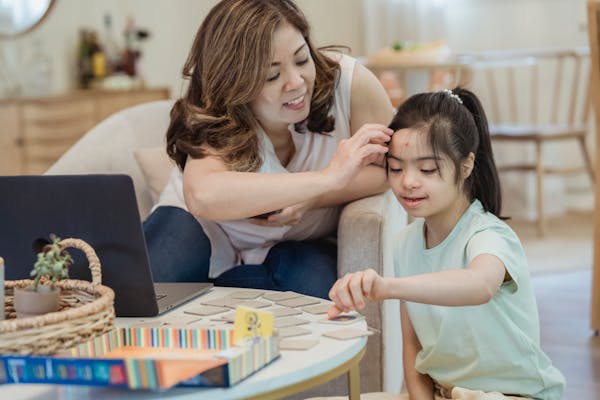Read Time 5 Minutes

“It’s not the ‘challenge’ of having a child with special needs. It’s the privilege of having a kid with special needs.” –Alan Roesch, father of a teenager with neurological disabilities
Whether a disability is diagnosed before birth or in college, few families receive the news with joy. Typical reactions are more akin to the classic stages of grieving a death: shock, denial, anger, despair.
In fact, something has died: a dream of having a healthy, angelic, high-achieving child who sails through life with nary a pain or problem. Although logic recognizes that as an impossible dream for any child, human tendency is to think in black-and-white terms. No Disability = brilliant, capable, easy to manage. Disability = helpless, disruptive, a constant bother.
And sometimes, those who should be a parent’s best supporters are better at giving us more to worry about. Friends and relatives offer simplistic advice. Teachers grumble about making special accommodations. There are even stories of doctors greeting brand-new mothers with dire predictions about what a newborn will neverbe able to do—and how caretaking stress may destroy the rest of the family.
A Person, Not a Burden!
Perhaps the grand prize for saying the wrong thing goes to the religious confessor in an incident recounted by Gina Gallagher, coauthor of Shut Up About Your Perfect Kid: A Survival Guide for Ordinary Parents of Special Children. After she admitted her struggles to accept her daughter’s autism, the first sentence out of that spiritual adviser’s mouth was, “Your daughter is your cross to bear in life.”
Really encouraging. Really respectful of differences. And, sadly, an attitude common to many special-needs parents and far too many people-on-the-street. Where did we ever get the idea that needing practical help takes away a person’s humanity and turns them into a “burden”?
Something to Be Thankful For
The wiser souls among us have a better approach: rather than waste energy bemoaning what they don’t have, they routinely practice gratitude for what they do have. Not only for things that go well in spite of a disability, but even for the disability itself.
Absurd? Consider that:
- Limited ability in some areas can mean stronger focus—and great achievements—in other areas.
- Having a household member with special needs can motivate families to stick together and to avoid the trap of “we never have together time because everyone is so busy with all their activities.”
- Your family is always first in the airplane boarding line; people are far less eager to crowd you or rush you; and you get plenty of opportunities to exercise your sense of humor!
Of course, all these benefits are largely contingent on using your sense of humor. And on staying free of self-pity and envy. And on treating your child as a valued family member who deserves individual consideration. The real burdens are the obstacles we create in our own minds through negative attitudes.
Growing a Positive Attitude
If you have difficulty seeing life with your child’s (or your own) disability as a blessing, the following attitude-booster tips will help.
- When your young child is struggling, don’t automatically blame the disability, or conclude this is a dead end. Remember that even “typical” children fall dozens of times while learning to walk.
- Let your child decide for herself what she wants to try and how she wants to approach it. Then, avoid “helping” unless things reach the point of real danger. Rushing to the rescue at the first hint of frustration will only undermine a child’s self-confidence—and future self-sufficiency.
- Also let your child take the lead in deciding how he wants you to play with him and show affection. Learn to appreciate his natural inclinations—and don’t treat them as something to be “cured” through unwanted pressure. (And remember, not everything that differs from your natural inclinations is a disability symptom.)
- Rather than reading every article on your child’s disability, spend extra time observing the child as a unique individual. Overdosing on outside expertise (from experts who don’t know your child) only generates extra confusion and worry.
- If you’re tempted to envy others who don’t have your concerns, remember that they are bound to have their own worries, struggles, and regrets. Not only is no one’s life perfect, the most envied people can also be the most personally miserable. (Witness the number of glamorous celebrities whose lives have fallen apart under long-hidden stresses.)
- Keep a gratitude diary, and encourage your child and the rest of the household to do the same. Writing down just five blessings a day makes a person healthier, happier, more hopeful, more effective, and easier to live with.
- Make time for fun and self-care.
- Cultivate a team spirit in your family. Ask siblings how they’d like to help out, rather than deciding what they should do.
- Give siblings their fair share of individual attention. And hear them out if they complain you expect too much of them. (Beware, also, of “protect the helpless” syndrome that automatically sides with the one who has the disability: special needs don’t necessarily make anyone blameless.)
- If you feel that another household member expects too much of a special-needs child, don’t get defensive: listen to everyone’s point of view, including the child’s, and look for win–win solutions.
- Don’t be ashamed to ask for extra caregiving assistance or other specific help.
- Give your special-needs child freedom to be herself, figure things out on her own, and enjoy life.
- Sometimes, the person with the disability proves to be the most positive member of the family. Never be too proud to learn from your child!


